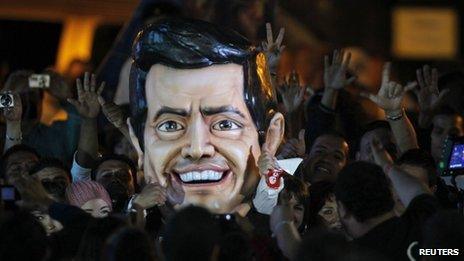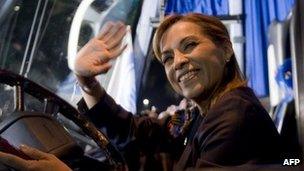Race to Mexico's presidential palace begins
- Published

Enrique Pena Nieto is the favourite to become Mexico's next president
At the stroke of midnight the starting pistol for the race to the presidential palace in Mexico was fired. Just minutes later the two leading contenders held noisy and colourful rallies in different cities to ask Mexicans for their support, the first of many before the vote on 1 July.
In reality, of course, the electoral machinery of all the main parties has been whirring for months.
None of the candidates want to launch a campaign from a standing start.
So, although electoral rules prohibit outright electioneering before the end of March, each party has been promoting its candidate for weeks without directly asking for votes.
Now, however, the fervent campaigning begins in earnest.
Television and radio stations in Mexico are about to bombard audiences with 20-second-long pleas for votes from all four candidates in the contest - nominees from the three main parties and an outsider.
The presidential hopefuls
The front-runner is the telegenic former governor of Mexico state, Enrique Pena Nieto.
He is standing for the party which ruled Mexico for most of the last century, the PRI.
His supporters hope his youth and clean-cut image will return them to power.
Mr Pena Nieto's opponents accuse him of being a member of the traditional political elite and out of touch with ordinary people.
But such criticisms, and a couple of high profile gaffes, seem to have made little difference to his momentum so far.
Recent polls put the PRI candidate more than 10 points ahead of his nearest challenger.
His closest opponent is Josefina Vazquez Mota, the first woman presidential candidate from a major political party in Mexico, standing for the governing Christian Democrat party, the PAN.
She faces a battle to reduce Mr Pena Nieto's lead.
There are suggestions of serious in-fighting within her party and in a recent phone-bugging debacle, she was recorded attacking members of the current administration.
The third main candidate is the runner-up from the last presidential election, Andres Manuel Lopez Obrador or "AMLO".
His rhetoric has changed significantly since he last stood for office.

Josefina Vazquez Mota kicked off her campaign in Mexico City
The once firebrand leftist leader has toned down his attacks on the business elite, no longer referring to them as the "mafia".
In 2006, he was narrowly beaten by the current president, Felipe Calderon, and for many months refused to recognise the result, holding long protests in central Mexico City which caused major disruption.
In his television spot, he calls for reconciliation in Mexico and apologises for the problems his protests created in the capital.
Thus far, the message has failed to inspire the voters who are yet to return to him in large numbers.
New campaign rules
But the fiercely-disputed election of six years ago has had a lasting effect on this vote in several other ways.
New electoral rules were agreed in 2008, which have introduced a number of unique idiosyncrasies to the Mexican presidential campaign.
Firstly, negative campaigning is banned.
"That rule is directly linked to the events of 2006," says election analyst Jose Antonio Crespo, referring to complaints from the Lopez Obrador camp that he had been subject to such deep and inaccurate personal criticism that it influenced the final result.
Of course, there are several ways around the measure.
"The rule mainly refers to the television and radio 'spots'. But you can't prevent politicians from making statements or giving interviews. We're already beginning to see the first personal attacks of this election," explains Jose Antonio Crespo.
The rule also crucially omits another vital element of the campaigning arsenal - the internet is unregulated.
Social media power
As a result, supporters of the different candidates have been using Facebook, Youtube and Twitter to launch slurs on their opponents.
Even though many voters in Mexico don't have access to the internet, the social media networks are still expected to be an important battleground, as they can be used to deliver the kinds of messages which are banned elsewhere.
Mr Pena Nieto is leading the field in internet campaigning with nearly two million followers on Facebook.
Josefina Vazquez Mota is also doing well, and both are said to be trying to replicate the success of the Obama 2008 campaign by using social media to directly contact voters.
The rules regarding television campaigns have also changed. No longer can the political parties buy space on the major TV networks.
Rather, the thousands of television spots which Mexicans will see in the coming weeks are coordinated by the country's federal electoral body and the TV channels must broadcast them free of charge.
Given the monopolies held by just a handful of media outlets in Mexico, it is an important development.
There will be two official televised debates and political analyst Jose Antonio Crespo says the candidates need to draw clearer divisions between their electoral platforms by the time the debates come around. Especially when it comes to the country's bitter drug war.
New priorities
"For years, the main priority for voters has been the economy and employment. Now the more reliable polls show that it is security and crime which voters are most concerned about," Mr Crespo says.
After six years of worsening violence, people are tired of the constant bloodshed in the country.
So far, however, none of the candidates has proposed a radically different strategy for tackling the drug cartels.
There are a potential 78 million voters due to cast their ballots in July, and as many as a third are still undecided.
The candidates all say that, in their hands, the country's economy will thrive and the brutal drug violence will start to come down.
They now have 90 days to make their case.
- Published23 March 2012